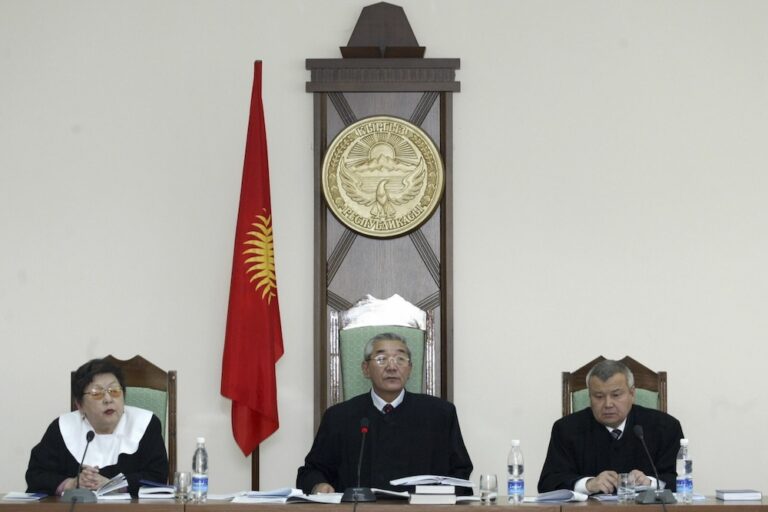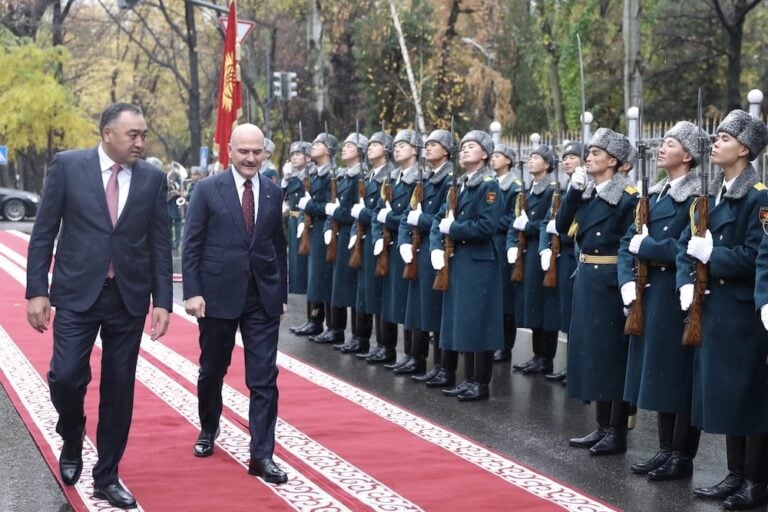The restrictive “foreign agents” law, a blatantly discriminatory bill to criminalize “homosexual propaganda,” and a proposed restriction on nonprofit organizations would result in serious deterioration of the working climate for nonprofit groups and for Kyrgyzstan’s LGBT community.
Kyrgyzstan’s parliament should decisively reject legislative proposals introduced in May 2014 that would seriously undercut human rights, Human Rights Watch said today. They are a restrictive “foreign agents” law, a blatantly discriminatory bill to criminalize “homosexual propaganda,” and a proposed restriction on nonprofit organizations. The new bills and proposed amendment to the law on nonprofit organizations may be put to a vote in the current parliamentary session, before the end of June. The measures would result in serious deterioration of the working climate for nonprofit groups and for Kyrgyzstan’s lesbian, gay, bisexual, and transgender (LGBT) community.
“These draft laws fly in the face of Kyrgyzstan’s human rights commitments – they would violate the fundamental rights to speech and association,” said Mihra Rittmann, Central Asia researcher at Human Rights Watch. “Adopting this harmful legislation would signify a clear backsliding on human rights in Kyrgyzstan and would seriously undermine the government’s efforts to improve its record.”
The draft “foreign agents” law appears directly aimed at restricting and curtailing the activities of nongovernmental organizations and would endanger freedom of association and expression, Human Rights Watch said. The bill would impose burdensome reporting requirements on these groups and could lead to a public perception that independent organizations are “foreign spies.” It would also allow authorities, without a court order, to suspend for up to six months groups that have not registered as “foreign agents.”
The bill would create criminal liability for the leaders of nongovernmental organizations “whose work incites citizens to refuse to fulfill their civic duties or commit other unlawful acts.” This overly broad and vague formulation could have the effect of criminalizing any type of civil disobedience, even moderate forms. This concern was raised in the October 16, 2013 joint interim opinion by the Office for Democratic Institutions and Human Rights, an organ of the Organization for Security and Co-operation in Europe (OSCE), and the Venice Commission, a Council of Europe advisory body.
The “propaganda of homosexuality” bill is blatantly discriminatory against LGBT people and would deny citizens across Kyrgyzstan their fundamental rights to freedom of speech, Human Rights Watch said.
The bill would impose criminal and administrative sanctions on mass media, independent groups, and others that are found to “create a positive attitude toward nontraditional sexual relations, using the media or information and telecommunications networks,” about LGBT people. The language of the bill is so vague that any information about LGBT people may be classified as “propaganda.”
On May 19, 2014, the Justice Ministry registered in parliament legislative amendments to the law on nonprofit organizations that would restrict the right to freedom of association. The proposed amendments include a provision that would require all nonprofit organizations to be registered. This amendment contravenes Kyrgyzstan’s constitution and, if adopted, would violate the right of Kyrgyzstan’s citizens to form unregistered nonprofit groups.
Since the two new bills were published for public discussion – the “foreign agents” law in September 2013 and the “propaganda law” in April 2014 – both domestic and international human rights bodies have voiced serious concern and have called on the bills’ sponsors to withdraw them.
In April 2014 for example, when the Parliamentary Assembly of the Council of Europe granted Kyrgyzstan’s parliament “partner for democracy” status, it expressly noted that to “strengthen democracy, the rule of law and respect for human rights and fundamental freedoms,” Kyrgyzstan should not pass laws that directly or indirectly restrict civil society activities, and should not adopt a prohibition on “homosexual propaganda.”
Yet within a month, the members of parliament sponsoring the two new bills registered them for parliamentary consideration. Around the same time, in mid-May, the Justice Ministry proposed the new restriction on civil society.
Kyrgyzstan’s international partners – especially the United States, the European Union and its member states, the Council of Europe, and the OSCE – should urge members of Kyrgyzstan’s parliament to reject the restrictive draft laws and amendment without delay, Human Rights Watch said. The government should firmly distance itself from these measures, making clear that discrimination and undue restrictions on nongovernmental groups have no place in Kyrgyzstan.
“Kyrgyzstan’s parliament made a pledge to uphold Council of Europe standards when it became a partner for democracy to the council’s Parliamentary Assembly,” Rittmann said. “Now it should give meaning to that pledge by taking a stand against discrimination and resolutely rejecting these restrictive measures.”


